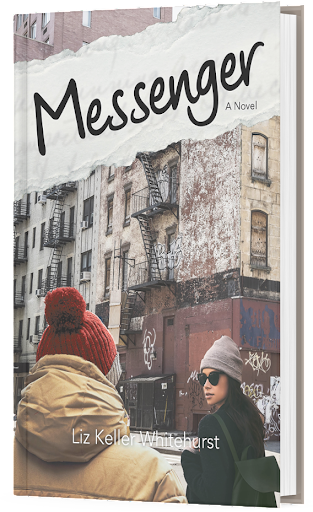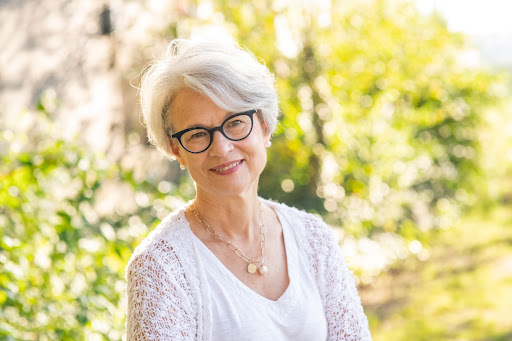Captivating podcast turned book about life-changing messages from a mysterious messenger
 Richmond, VA — Author Liz Keller Whitehurst first released her inspirational debut novel, Messenger (Warren Publishing, Oct. 19, 2021), as a riveting 16 episode podcast series in 2020, the timing perfect amid the pandemic that had many people searching for encouraging messages to hang on to.
Richmond, VA — Author Liz Keller Whitehurst first released her inspirational debut novel, Messenger (Warren Publishing, Oct. 19, 2021), as a riveting 16 episode podcast series in 2020, the timing perfect amid the pandemic that had many people searching for encouraging messages to hang on to.
Now, Whitehurst is adapting her podcast into a print book, with the same pivotal themes of initiation, connection, relationship, and mystery, which form the heart of this refreshing novel. Whitehurst reminds us that we are all messengers for each other, and that empathy and connection can come from the most unexpected places.
“You know that message everybody’s been waiting for their whole lives, as long as they can remember? Well, I bring that message. That’s my job. It’s up to me.”
While searching for a new, intriguing story among the insanely competitive media world of New York City, young journalist Alana Peterson finds Messenger, an old woman who gives life-changing messages to strangers all over the city. Alana thinks she’s found her big break with Messenger’s story, but soon realizes there is much more to Messenger than meets the eye. Through a series of mistakes, Alana bends the trajectory of the story to tragic results, only then realizing Messenger’s bigger plans.
“Oh, no, Honey. Not the end. A new beginning!”
“Messenger”
Liz Keller Whitehurst | October 19, 2021
Warren Publisher | Literary Fiction/Spiritual
Paperback | 978-1-954614-44-4 | $17.95
More about Liz Keller Whitehurst
 Liz Keller Whitehurst is the author of the forthcoming debut novel, Messenger, and author/creator of the serial podcast MESSENGER: A NOVEL IN 16 EPISODES, which she launched in 2020. Her short stories have appeared in many literary magazines and journals, including Gargoyle, The Portland Review, Five Fingers Review and Nimrod International Journal. She was a finalist in Nimrod International Journal’s Short Story Competition. She earned an MA in English from The University of Virginia. In addition to fiction writing, Liz has spent her professional life writing and teaching. She’s done corporate, non-profit and freelance writing and has taught English and writing at Virginia Commonwealth University, University of Richmond and J. Sargeant Reynolds Community College. Her last teaching post was co-leading a memoir writing class at the city jail. Though born in Ohio, Liz grew up in Winchester, Virginia and has lived her adult life in Richmond, Virginia. She shares her current 1891 home, located in one of Richmond’s oldest neighborhoods, with her husband. Her second-floor writing desk overlooks the James River.
Liz Keller Whitehurst is the author of the forthcoming debut novel, Messenger, and author/creator of the serial podcast MESSENGER: A NOVEL IN 16 EPISODES, which she launched in 2020. Her short stories have appeared in many literary magazines and journals, including Gargoyle, The Portland Review, Five Fingers Review and Nimrod International Journal. She was a finalist in Nimrod International Journal’s Short Story Competition. She earned an MA in English from The University of Virginia. In addition to fiction writing, Liz has spent her professional life writing and teaching. She’s done corporate, non-profit and freelance writing and has taught English and writing at Virginia Commonwealth University, University of Richmond and J. Sargeant Reynolds Community College. Her last teaching post was co-leading a memoir writing class at the city jail. Though born in Ohio, Liz grew up in Winchester, Virginia and has lived her adult life in Richmond, Virginia. She shares her current 1891 home, located in one of Richmond’s oldest neighborhoods, with her husband. Her second-floor writing desk overlooks the James River.
Follow Liz around:
Instagram: @lizkellerwhitehurst
Facebook: @lizkellerwhitehurst
Website: lizkellerwhitehurst.com
In an interview, Liz Keller Whitehurst can discuss:
- How her own great need inspired a story of connectivity and empathy
- Why she decided to release her book first as a podcast, and why she’s releasing it as a print book now
- The process of turning a book into a podcast, and vice versa
- Her writing process and why she chose multiple narrative forms to tell this story
- The use of magical realism in the book
- The real-life messages she received from podcast listeners
- What a clinamen is and how it relates to her novel
- How it feels to be a debut novelist in her 60’s
- How we can all be messengers for ourselves and each other
An Interview with Liz Keller Whitehurst
1. What’s one message you received that changed your life?
On the morning before my birthday, April 2020, with the COVID-19 epidemic surging, I awoke with a clear and urgent message: Messenger’s time has come. Figure out a way to get Messenger’s story out.
2. When did you start putting together the story for Messenger?
The seeds of Messenger began in 2013, when, during a time of great need, I begged for a message, for the answer to an undiagnosable health challenge my college-aged daughter faced. I went to New York City, where she was a student, to help. Every day while she was in class, I walked the cold, gray streets, stared into the faces of the multitude of people I passed, and wondered if they were desperate for a message, too. To distract myself, I journaled descriptions of faces, interesting people, physical locations, sounds, smells. I had no idea I was working on a new book.
3. How would you describe your writing process? What made you choose to write multiple narrative forms?
I am definitely a pantser (write by the seat of my pants) versus a plotter (planner and outliner) and I “see” and “hear” scenes organically. I strive to get them down as best I can while having no idea how the puzzle parts fit together. I’m also quite influenced by my life and particularly by what I’m reading. Messenger’s multiple narrative forms were really inspired by, believe it or not, Moby Dick! Of course I’m not comparing Messenger to Melville’s tour-de-force, but that’s where I got the idea to use multiple narratives, journals, and lists as a structure to tell the story The character of Messenger came first but I knew I needed another character to form a relationship with her and to create some action. Then I read The Immortal Life of Henrietta Lacks, the wildly successful and amazing non-fiction book by Rebecca Skloot. My character Alana, inspired by Rebecca, was born.
4. The book being released as a podcast first is such a fun, unique twist! What made you decide to release Messenger first as a podcast?
I finally finished Messenger mid-2019, it made the rounds of traditional publishers, thanks to my wonderful agent, April Eberhardt, got reads, but no traction. Then the holidays and 2020 came and everything changed with the pandemic. After I received the message to find a way to get Messenger out, my first idea was to create a website and release the book in episodes, as a serial novel. I queried some trusted friends, especially creative extraordinaire, Rachel Pater, and received another message from them: make Messenger a podcast. Thanks to our talented podcast team, we launched MESSENGER: A NOVEL IN 16 EPISODES in July, 2020. It’s still free and available on my website and at messengerthenovel.com or wherever you get your podcasts.
5. What would you like readers to take away from your book?
My hope is that Messenger readers will find light, comfort, hope, perspective, motivation and inspiration in its pages, will sense the underlying connection we all share, and will believe that a slight swerve can change everything. I also hope readers will wake up and watch for messages coming their way and look for opportunities to be messengers for others.
6. A writer always loves hearing from readers, but you asked your podcast listeners, Have you ever received a message from an unexpected source? What was your response?
We received so many messages from this request we created two bonus episodes of real-life messages from listeners. The messages people shared were diverse and intriguing, inspiring and mysterious. Though all very different, one aspect was key to all the messages–timing. Just like Messenger’s messages!
7. You use the term clinamen in the novel and define it as a slight swerve that changes everything. What do you mean? What is its significance to the novel as a whole?
There are many definitions for the term clinamen but in this novel it refers to the underlying theme that a slight swerve–in a life, a city, the world–can change everything. Messenger teaches Alana that a mysterious underlying web connects everyone and everything. Because of this interconnectedness, what happens to any one life affects the whole. That’s how Messenger works.

A former award-winning journalist with national exposure, Marissa now oversees the day-to-day operation of the Books Forward author branding and book marketing firm, along with our indie publishing support sister company Books Fluent.
Born and bred in Louisiana, currently living in New Orleans, she has lived and developed a strong base for our company and authors in Chicago and Nashville. Her journalism work has appeared in USA Today, National Geographic and other major publications. She is now interviewed by media on best practices for book marketing.

